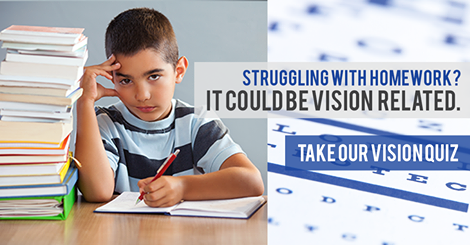
The American Academy of Pediatrics (APA) recently published a policy statement (opinion piece) about visual problems that can arise after a child suffers a concussion, and the various treatment options the organization recommends.
The AAP Section on Ophthalmology, the American Academy of Ophthalmology, the American Association for Pediatric Ophthalmology and Strabismus, and the American Association of Certified Orthoptists co-authored the policy statement and clinical report.
We couldn’t help but notice that the APA omitted vision therapy as a treatment.
While we respect the APA and its dedication to children’s health, we are concerned about the omission.
At Coleman Vision, we’re passionate about spreading awareness of the life-changing benefits that vision therapy can offer, and we have the science to back it up.
Why is Vision Therapy Sometimes Overlooked?
The answer to this difficult question may lie in the nature of our work. The goal of vision therapists and neuro-optometrists is to develop and strengthen the visual system, especially the communication between the eyes and the brain.
Other professionals also treat the visual system but tend to rely on the methods and tools most [utilized] in their fields of discipline, not realizing - or dismissing - the proven benefits of other treatments.
Optometrists with experience in vision therapy look at the bigger picture. We realize that treating the deficits resulting from a concussion or other type of brain injury often requires an interdisciplinary approach that calls for various health care providers to participate.
It is the patient who suffers when medical professionals ignore the importance of vision therapy provided by a developmental optometrist or neuro-optometrist in this delicate process.
Is Vision Therapy Really Backed by Science?
Absolutely.
In fact, studies have shown that vision therapy can effectively treat a wide range of vision problems, such as convergence insufficiency, amblyopia and so much more. Vision therapy can also get to the root of learning difficulties and misdiagnosed ADHD caused by vision problems, offering a child a lifetime of success and increased confidence.
We appreciate the individuals and professionals who support us and recognize vision therapy for what it truly is: an evidence-based approach to visual healing that works.
Vision Therapy in Joplin
We’re passionate about what we do, and we’re willing to take a stand to spread the truth.
At Coleman Vision, we proudly provide patients with vision therapy to help them achieve their visual goals in the most effective and efficient way possible.
To learn more about vision therapy and whether it can help you or your child, call Coleman Vision in Joplin today!
Frequently Asked Questions with Dr. David Coleman and Dr. Jeff Coleman
Q: What’s involved in vision therapy?
A: Vision therapy is a tailor-made program of visual exercises that are performed in-office under the supervision of a developmental optometrist on a weekly basis. These exercises aim to establish, develop and strengthen the connection between the eyes and brain in order to achieve clear vision. Some of the conditions that a vision therapist treats include amblyopia, strabismus, convergence insufficiency, eye misalignment problems, focusing problems, eye movement problems and eye-hand coordination, among others. Vision therapy can help patients who have suffered a concussion, stroke or other type of brain injury. Speak with us to find out if vision therapy is right for your condition.
Q: How long does vision therapy take to work?
A: The answer will depend on the severity and type of visual condition, as well as the patient’s level of participation. Generally, a vision therapy program will last anywhere from 10 weeks to several months. Patients often see improvements in their condition within the first few sessions. Because the results are long-lasting, a second round of vision therapy sessions is rarely needed.
